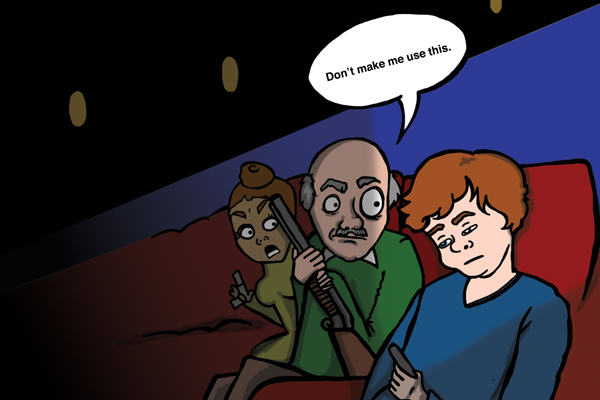Advocates demand reform to prevent reckless texting
Illustration by Tina Wallace
A man who fatally shot another movie-goer at a Florida theatre has pleaded self-defence against his charges for second-degree murder. The shooting occurred on Jan. 13 after a 43-year-old father sent a text message to his daughter during the previews. The victim, a 71-year-old retired police officer, shot the texter after an argument ensued when the texter refused to apologize for his conduct.
The situation shows the dangers of text control, a growing problem in North America.
Texters armed with phones are becoming more and more common and pose a serious threat to the public. While the Floridian neighbourhood of Pasco County has proved to be safe and ideal for families, the emergence of this new threat has many local families seeking a change.
The Florida Association Against Movie Texting (FAAMT) recently spoke out in response to this incident.
“The dangers of texting during a movie are growing fast,” said Gretchen Aaronson, a representative of FAAMT. “If you can’t fully concentrate on a film, you might become disoriented and use your firearm inappropriately.”
Parents in the local neighbourhood, particularly concerned for the safety of their youth who frequent the theatre, also had much to say on the controversial issue.
“Honestly, I’m just disgusted that this person would even bring a cell phone in,” said Jack Cannon, a distressed local father of two. “He wasn’t even considering that he put all the kids in that theatre in danger.”
Jenna Kraemer, a mother of two, was appalled that some people have blamed the shooter.
“I just can’t believe someone would defend someone who brought a cell phone into a movie theatre,” said Kraemer. “Everyone knows that bright screens can cause severe strain on the eyes, especially among children. We should be thanking that gunman.”
Many strongly worded letters were written to the FAAMT about the inappropriateness of bringing a cellular device into a movie theatre. While it is a second amendment right in America to own and carry a cell phone, the majority of writers agree that the movie-texter used their device in a manner that was simply uncalled for. In most cases, people felt that the presence of the object in a public area violated their basic safety rights.
Some Florida cinemas are now enforcing a formal search prior to the movie so that the hazards of cell phones will no longer disrupt the movie experience.
FAAMT has released many public service announcements and advertisements requesting that all movie-goers leave their cell phones at home so that another fatal frenzy can be avoided. They warn that owning a cell phone is a serious decision, and according to one of its advertisements, “should not be taken lightly.”
FAAMT ultimately wants people to learn that they should not purchase cell phones until they feel they are mature enough to understand the dangers and social implications of the device.
“I understand people may be inclined to own a cell phone. It is a personal decision,” said Kraemer. “But to use your personal decision hatefully against innocent people is just something that cannot, and should not, be tolerated.”





